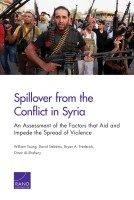| 来源类型 | Research Reports
|
| 规范类型 | 报告
|
| DOI | https://doi.org/10.7249/RR609
|
| ISBN | 9780833087263
|
| 来源ID | RR-609-OSD
|
| Spillover from the Conflict in Syria: An Assessment of the Factors that Aid and Impede the Spread of Violence |
| William Young; David Stebbins; Bryan Frederick; Omar Al-Shahery
|
| 发表日期 | 2014
|
| 出版年 | 2014
|
| 页码 | 84
|
| 语种 | 英语
|
| 结论 |
Certain Factors Contribute Directly to the Spread of Violence - External military support, large numbers of refugees, and the fragility of neighboring states are factors that contribute directly to the spread of violence from civil war and insurgency.
- Additional factors are ethnic ties, access to open media, perceived uncertainty and government overreaction by neighbors, timing and effectiveness of intervention, and government and insurgent capabilities.
Neighboring States Will Be Affected Differently- Turkey has been and will continue to be significantly affected by the ongoing civil war in Syria. The enormous number of Syrian refugees alone will impose many financial and governance challenges. However, the prospects for the spillover of significant armed conflict are limited.
- Lebanon's particularly high risk of conflict spillover stems from its crippled government, division among its internal security forces, and continued external/Iranian support to Hizbollah. As the Syrian opposition continues to battle supporters of Assad both in Syria and in Lebanon, the propensity for conflict to spill over will remain high and drag Lebanon closer into a full-blown regional conflict.
- Iraq's political and religious rifts are segregating people across the same sectarian lines that now define the main political agendas of combatants in Syria. Both Sunnis and Shia in Iraq are waiting to see how events might unfold in Syria. Both of these groups perceive the end state of the Syrian conflict as one that could play a major role in shaping Iraq's political future.
- The Syrian conflict is wearing on the delicate political, economic, and social fabric of Jordan. The growing refugee population along the border puts excessive pressure on already scarce water supplies and on civilian and security infrastructure. But the radicalization of Syrian youth in Jordanian refugee camps and the spread of extremist ideas are the primary causes for concern.
|
| 摘要 |
- To impede the spillover of violence now occurring in Lebanon and Iraq and to reverse the likelihood of it spreading into Turkey and Jordan, it will be necessary to address the underlying causes of the spillover in the region.
- Outside parties should negotiate with and persuade the Arab Gulf states, Iran, and Russia to curtail their military assistance to the rebels and the regime.
- A cease-fire should be negotiated or imposed to allow the time and space needed to set up safe zones and protected, safe-passage corridors so refugees can return and humanitarian aid can be provided. These measures are likely to require the presence of some type of international stabilization force.
|
| 主题 | Iraq
; Jordan
; Lebanon
; Peacekeeping and Stability Operations
; Politics and Government
; Refugees
; Syria
; Turkey
|
| URL | https://www.rand.org/pubs/research_reports/RR609.html
|
| 来源智库 | RAND Corporation (United States)
|
| 引用统计 |
|
| 资源类型 | 智库出版物
|
| 条目标识符 | http://119.78.100.153/handle/2XGU8XDN/107876
|
推荐引用方式
GB/T 7714 |
William Young,David Stebbins,Bryan Frederick,et al. Spillover from the Conflict in Syria: An Assessment of the Factors that Aid and Impede the Spread of Violence. 2014.
|
|
文件名:
|
x1535054606115.jpg
|
|
格式:
|
JPEG
|

|
文件名:
|
RAND_RR609.pdf
|
|
格式:
|
Adobe PDF
|
除非特别说明,本系统中所有内容都受版权保护,并保留所有权利。